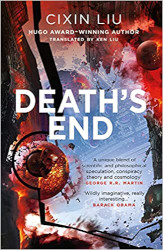In almost every trilogy of books that I have read so far, the quality of the books invariably goes down after the first book. Not so for “Death's End” by Cixin Liu, the last book in the “Remembrance Of Earth's Past” trilogy of science-fiction books. This book is the best in the series with an astounding scale (of both space and time), as well as containing some poignant tales. This was a pleasant surprise after reading the disappointing first book and the decent second book.
The initial events described in the book overlap some of the events described in the second book, but then the book quickly moves on to describe events from vastly bigger time-frames as well as distances. While some of the characters from the first and the second book are present here, the main characters are entirely different. The aliens from the Trisolaris system who were launching an invasion on Earth in the first and the second book now collaborate harmoniously with the humans (after a suitable deterrent is set in place by humans, that would cause the destruction of both the systems by other aliens in the universe).
However, the peace is relatively short-lived and the aliens soon show their true face. They ruthlessly attack cities on Earth and force the entire human population to resettle in Australia, killing a lot of humans in process. They recruit some of the humans to control the other humans and force the resettled humans to give up electricity, modern agriculture, decent living quarters, etc. Can humanity survive this crisis? Can the universe itself survive aliens even more advanced and more ruthless than those from Trisolaris? You will have to read the book to find out.
The book takes the “Dark Forest” theory from the second book to its logical extreme, in the process producing some surprising and dark results. As in the other two books, it describes in a matter of fact manner disturbing acts of humans towards each other when faced with extreme existential crises. Interspersed among the descriptions of different dimensions, multiple universes, vast distances, incredible time-spans, insane speeds, etc. is a good old story about unrequited love that is deeply moving. If nothing else, the book is certainly an ambitious undertaking in more ways than one.
That said, as with the other two books, the language is quite unnatural and the style is quite dry and stilted. This book is once again China-centric in an odd way. (I realized while reading this book that the three books only talk about China, USA, Russia, Australia, and some parts of Europe – there seems to be no mention of India, the Middle East, Africa, etc. – as if the rest of the world is of no consequence whatsoever to the evolution of the human race.)
This book has redeemed the entire trilogy for me. I can recommend this series of science-fiction novels to fans of this genre if they can look past its oddities of language and characters. The books lean more towards the “science” part of science-fiction than the “fiction” part, sometimes annoyingly so (as some of the science here is quite dubious, while the author takes great pains to explain some bits). Lovers of general fiction in English might therefore not find these books to their taste.
